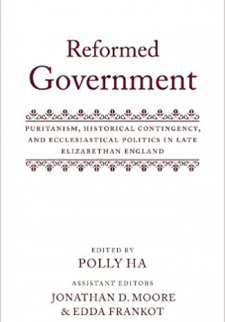Oxford University Press

The culmination of cultural and literary achievements in the final decade of Elizabeth I's reign coincided with some of Tudor England's worst years economically which were exacerbated by plague, successive harvest failure, and belligerence at home and abroad. This critical edition of the scribal publication 'Reformed Government' c. 1594 provides a unique point of entry into the 1590s. Recovering a pivotal moment in the history of puritan radicalism, it represents the most extensive reformed response to the onslaught of anti-puritan literature in the late sixteenth century, including Richard Hooker's iLaws of Ecclesiastical Polityr. In addition to mounting an epistemological and ecclesiastical defence of reformed presbyterian government, it sheds light on new appropriations of Renaissance ideas about historical contingency, and introduces a dynamic reading of Christian antiquity.
The edition also provides a wider context for later developments in the seventeenth century. Exploiting the instability of the period, the 'Reformed Government' seized the opportunity to re-imagine society and even anticipated the idea of altering civil and religious constitutions which theorists later developed in Revolutionary Britain. By expanding and reconfiguring the relationship between civil and ecclesiastical government, it imaginatively stretched the implications of historical change to entertain new possibilities. This recovery of an alternative vision of a reformed society in the late sixteenth century offers an alternative model for reading church history. Based on maximal visions and proposals of reform, the 'Reformed Government' is essential reading for the study of ecclesiastical tradition alongside confessional documents and summative statements.